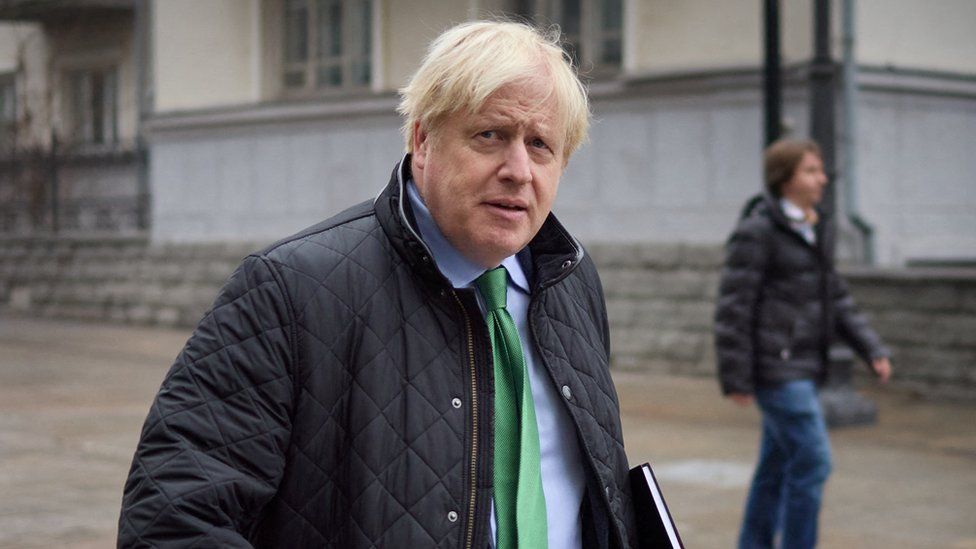ARTICLE AD BOX
 Image source, Reuters
Image source, Reuters
By Paul Seddon & Helen Catt
BBC News
Partygate played a key part in Boris Johnson's ousting from Downing Street, and hasn't finished with him yet.
The former prime minister still faces an inquiry by the Commons Privileges Committee over whether he misled MPs over the scandal.
The probe, commissioned by the Commons in April last year, has largely dropped out of the headlines since Mr Johnson left office.
But it is about to come roaring back onto the political agenda, with reports that hearings could begin in the coming weeks.
Here's what we know about the investigation that will prove crucial for Mr Johnson - and for his successor Rishi Sunak.
Recap: why is he being investigated?
Opposition parties have accused Mr Johnson of misleading MPs about what he knew about gatherings in government buildings during Covid lockdowns.
On several occasions after the Partygate scandal emerged in late 2021, he told the Commons that pandemic rules had been followed.
But an investigation by senior official Sue Gray later found widespread rule-breaking had in fact taken place. And a police inquiry led to fines for 83 people, including Mr Johnson himself, for attending law-breaking events.
The ex-prime minister has admitted his original statements to MPs have since proved incorrect - but has said he believed them to be true at the time.
He has denied deliberately misleading Parliament, and said he has "absolutely nothing, frankly, to hide".
What will the committee decide?
The seven MPs on the committee will examine whether Mr Johnson committed a "contempt of Parliament" - described by the parliamentary rulebook as anything that prevents Parliament from functioning properly.
In July 2021, they decided they would not have to prove Mr Johnson deliberately misled MPs to show he committed this offence.
That provoked an outcry among allies of the former prime minister - who said it showed the inquiry was biased against him.
A legal opinion commissioned by the government on behalf of Mr Johnson, published in September 2021, also took issue with the committee's approach, calling it "fundamentally flawed".
But the committee has rejected accusations of bias, saying its decisions were based on advice from impartial officials.
It will be sticking to its original interpretation of the rules - and has hit back with a paper of its own, saying the government's legal opinion was based on "misplaced analogies" with the criminal law.
Image source, Getty Images
Image caption,Boris Johnson was forced to resign last year after a ministerial revolt over a string of scandals
Who sits on the committee?
The Conservative-majority committee is chaired by senior Labour MP Harriet Harman, a former cabinet and shadow cabinet minister.
She took on the role in June last year from party colleague Sir Chris Bryant, who stepped back because he had criticised the PM in media interviews before the inquiry was launched.
The other members are Labour's Yvonne Fovargue, the SNP's Allan Dorans, and Tories Andy Carter, Sir Bernard Jenkin, Alberto Costa, and Sir Charles Walker.
A former appeal court judge, Sir Ernest Ryder, has been appointed to advise them during the probe.
What evidence will they gather?
The committee has contacted witnesses to submit written evidence by 7 February. They will be able to submit evidence anonymously, with committee staff verifying their identity.
The submissions will be shared with Mr Johnson, with the committee reserving the right to conceal their identity where "appropriate".
The committee has requested a trove of documents, including Mr Johnson's diaries and briefing notes given to him before appearances in the Commons.
It has also asked for entry logs into government buildings, emails and WhatsApp messages about resignations, and pictures taken by Downing Street's official photographer.
Image source, Cabinet Office
Image caption,Some photos of Boris Johnson at gatherings in No 10 were published in Sue Gray's report
It's understood that security measures have been taken to keep the evidence under wraps whilst the inquiry is ongoing.
At some point, Mr Johnson himself will be asked to undergo a public grilling by the committee, which is expected to be televised live.
Although it's not a legal process, he will be able to bring a lawyer with him and take advice. However, the former prime minister will have to answer MPs' questions himself.
The committee has also asked for access to 10 Downing Street and the Cabinet Office, to inspect areas where gatherings mentioned by Mr Johnson in the Commons were held. It is not clear if this has yet taken place.
What could happen to him?
The committee will recommend whether Mr Johnson committed a contempt, and if so how he should be punished, to the whole House of Commons for a final decision.
Possible punishments range from ordering him to apologise to suspending him from the Commons for a period of time.
If they decide to suspend Mr Johnson for more than 10 days, it would trigger a "recall petition" in his Uxbridge and South Ruislip constituency, a process that could potentially lead to a by-election.
Suspensions of this length, however, have been rare in recent years.
The outcome of the inquiry will be pivotal for Mr Johnson's political future. Any finding that he misled Parliament could sink his hopes - never ruled out - of one day returning to high office.
A finding of contempt, however, would also be a major headache for Rishi Sunak - forcing him to decide whether to tell his MPs how to vote.
That would open up dormant divisions among the Tory party, particularly if Mr Johnson's supporters cry foul over the outcome.

 1 year ago
22
1 year ago
22








 English (US) ·
English (US) ·